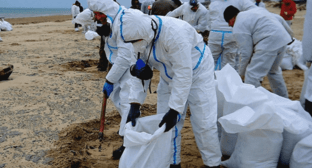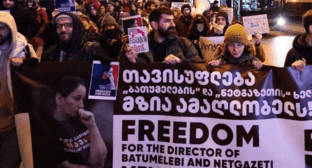20 December 2007, 20:35
Georgia: Government Used Excessive Force on Protesters
Government's Reputation as Human Rights Champion Damaged
Tbilisi, December 20, 2007
The Georgian government resorted to excessive force on November 7 when it violently dispersed demonstrators here in the country's capital and raided the private Imedi television station, Human Rights Watch said in a report released today.
Since the peaceful Rose Revolution in 2003, Western governments have hailed Georgia as an example of a successful transition to democracy and a human rights champion in the former Soviet Union. The November 7 violence exposed the government's shaky commitment to human rights and the rule of law.
"Our research clearly shows that the Georgian government crossed the line when police chased and beat peaceful demonstrators, and threatened and intimidated journalists," said Holly Cartner, Europe and Central Asia director at Human Rights Watch. "The November 7 police operations were not legitimate means of policing. They have done serious damage to Georgia's reputation as a champion of human rights."
The 102-page report, "Crossing the LineGeorgia's Violent Dispersal of Protestors and Raid on Imedi Television," is the most comprehensive account to date of the Georgian government's attacks on protestors and the raid on Imedi. Witnesses described in detail how police and other law enforcement agents violently dispersed protestors in four separate incidents on November 7.
The report also documents the heavily armed raid on and closure of Imedi television, which is partly owned by Rupert Murdoch's News Corporation. Hundreds of police intimidated and threatened Imedi staff before ejecting them from the studios and then destroying and damaging the station's equipment.
The November 7 police violence capped several days of peaceful demonstrations that had begun on November 2 in front of the Parliament on Rustaveli Avenue in central Tbilisi. Georgia's opposition parties were calling for parliamentary elections to be held in early 2008 and for the release of political prisoners. Many citizens who participated in the demonstrations complained of high unemployment and continuing poverty, as well as perceived government corruption.
Large crowds gathered at approximately 11 a.m. in response to calls by opposition leaders to protest an early morning police raid on demonstrators and hunger strikers who had spent the night on the steps of Parliament. The government called in riot police after demonstrators broke through one police line and filled Rustaveli Avenue. After briefly issuing warnings to disperse and using a water cannon against the front rows of demonstrators, riot police simultaneously launched a volley of teargas and rubber bullets into the crowd. Masked riot police and other forces then pursued the fleeing demonstrators, kicking and punching them, and striking them with truncheons, wooden poles, and other objects. Riot police used the same methods when crowds then gathered at Rike, a large open area several kilometers from the city center with no through streets.
Later that evening, hundreds of special forces troops armed with machine guns and other weapons entered the Imedi television studios. They forced journalists and other staff members to the floor and pointed guns at their heads. They forced Imedi off the air, after news anchors managed to describe the raid to viewers in the final minutes of broadcasting. The Imedi staff was evicted, and troops damaged or destroyed much of the station's equipment. The staff and its supporters who had gathered outside of the gate were then set upon again by riot police firing teargas and rubber bullets and attacking individuals with truncheons.
Imedi began broadcasting again in mid-December, after a month of intense negotiations between the government and News Corporation. Senior Imedi officials claim much of the equipment was destroyed or missing.
The Georgian government claims that, in dispersing the protests and closing Imedi, it was responding to threats of massive public disorder and a coup d'etat supported by Russian counter-intelligence and the exiled businessman Badri Patarkatsishvili, who has financed the opposition and was the founder and part-owner of Imedi.
"Whether or not the Georgian government was facing the threat of a coup, the authorities still have the obligation to respect basic human rights and to ensure that police respond to protests in a lawful and proportionate manner," said Cartner. "The government's response to any perceived threat posed by Imedi was clearly excessive and a violation of freedom of expression."
Late in the evening on November 7, the government declared a state of emergency, which was lifted eight days later. To help diffuse the political crisis, President Mikheil Saakashvili on November 8 called early presidential elections to be held on January 5, 2008. In accordance with the election laws, Saakashvili stepped down on November 25 in advance of the elections. Saakashvili and eight others, including Patarkatsishvili, will vie for the presidency.
"No matter who wins the upcoming presidential elections, Georgia has a lot of work to do to ensure accountability for the serious abuses that took place on November 7," said Cartner. "The re-opening of Imedi is a welcome step, but the government must also investigate and prosecute the crimes committed by law enforcement. Only then can the government count on public trust and support."
Georgia's international partners, including most prominently the United States and the European Union, have provided unwavering support for President Saakashvili and his government since it came to power in the Rose Revolution. Western governments have been reluctant to publicly criticize the Georgian government, giving credence to the government's repeatedly stated good intentions and promises of reform.
"Even before November 7, there were serious signs that the Georgian government was actually undermining the rule of law and human rights principles it had espoused during the Rose Revolution," said Cartner. "It's high time for the US and EU to confront Georgia on its shaky human rights record and insist on accountability for the November 7 events."
"Crossing the Line: Georgia's Violent Dispersal of Protestors and Raid on Imedi Television" is available at: http://hrw.org/reports/2007/georgia1207/
: "Zakareishvili: events on November 7 in Georgia have moved the journalist phenomenon to the forefront."
January 19, 2025 01:22
-
Relatives alarmed by health state of three Kuban pensioners in SIZO
Pensioners Nikolai Nabiev, Sergey Kuzovenko, and Marina Zakharova, accused of creating an illegal armed formation (IAF), complain about their health problems in a SIZO (pre-trial prison).
January 18, 2025 22:48
-
HRW claims deterioration of human rights situation in Azerbaijan
In its annual report on the human rights situation, the “Human Rights Watch” (HRW) international human rights organization has pointed to the intensification of repression against journalists and activists in Azerbaijan, as well as the practice of torture in prisons and the persecution of LGBT* community members.
January 18, 2025 22:39
-
Father of Sochi engineer Alexei Schus is stunned by his son's sentence
A court in Sochi has found Alexei Schus, an engineer, guilty of spreading fake news about the Russian Army motivated by hatred and sentenced him to 5.5 years in colony. He was also banned from administering websites for three years, the human rights project "OVD-Info"* has reported.
January 18, 2025 22:14
-
Rights defender Nagavkin asks Putin to send colony inmates to Anapa
In a letter to the Russian President, Igor Nagavkin, a convicted human rights defender, has offered to involve prisoners from the penal colonies in the liquidation of the environmental disaster in Kuban (the Krasnodar Territory) and expressed his desire to go to Anapa; he himself has expressed his readiness to take part in cleaning the beaches voluntarily and free of charge.
January 18, 2025 20:38
-
In Tbilisi, march participants demand to release Mziya Amaglobeli
On the 50th day of protests against the suspension of Georgia’s European integration, activists demanded to provide them with airtime on the “Georgian Public Broadcaster” Radio and TV Company to talk about the circumstances of the detention and arrest of Mziya Amaglobeli, the founder of the “Batumelebi” and “Netgazeti” online publications.
-
January 19, 2025 01:22

Relatives alarmed by health state of three Kuban pensioners in SIZO
-
January 18, 2025 22:48

HRW claims deterioration of human rights situation in Azerbaijan
-
January 18, 2025 22:39

Father of Sochi engineer Alexei Schus is stunned by his son's sentence
-
January 18, 2025 22:14

Rights defender Nagavkin asks Putin to send colony inmates to Anapa
-
January 18, 2025 20:38

In Tbilisi, march participants demand to release Mziya Amaglobeli
-
January 19, 2025 01:22
Relatives alarmed by health state of three Kuban pensioners in SIZO
-
January 18, 2025 22:48
HRW claims deterioration of human rights situation in Azerbaijan
-
January 18, 2025 22:39
Father of Sochi engineer Alexei Schus is stunned by his son's sentence
-
January 18, 2025 22:14
Rights defender Nagavkin asks Putin to send colony inmates to Anapa
-
January 18, 2025 20:38
In Tbilisi, march participants demand to release Mziya Amaglobeli
-
January 19, 2025 01:22
Relatives alarmed by health state of three Kuban pensioners in SIZO -
January 18, 2025 22:48
HRW claims deterioration of human rights situation in Azerbaijan -
January 18, 2025 22:39
Father of Sochi engineer Alexei Schus is stunned by his son's sentence -
January 18, 2025 22:14
Rights defender Nagavkin asks Putin to send colony inmates to Anapa -
January 18, 2025 20:38
In Tbilisi, march participants demand to release Mziya Amaglobeli -
January 18, 2025 18:17
Analysts: abnormal birth rate in Chechnya on December 31 could be provoked by manipulations -
January 17, 2025 23:59
Rights defenders comment on report about "exchange fund" of volunteers in Chechnya -
January 17, 2025 23:58
Human rights defender complains about not being allowed to visit Nagavkin in penal colony -
January 17, 2025 23:18
Human rights defenders point to political motives for founder of Georgian opposition media Amaglobeli’s arrest -
January 17, 2025 21:49
Zhuravel appeals against verdict in his treason case